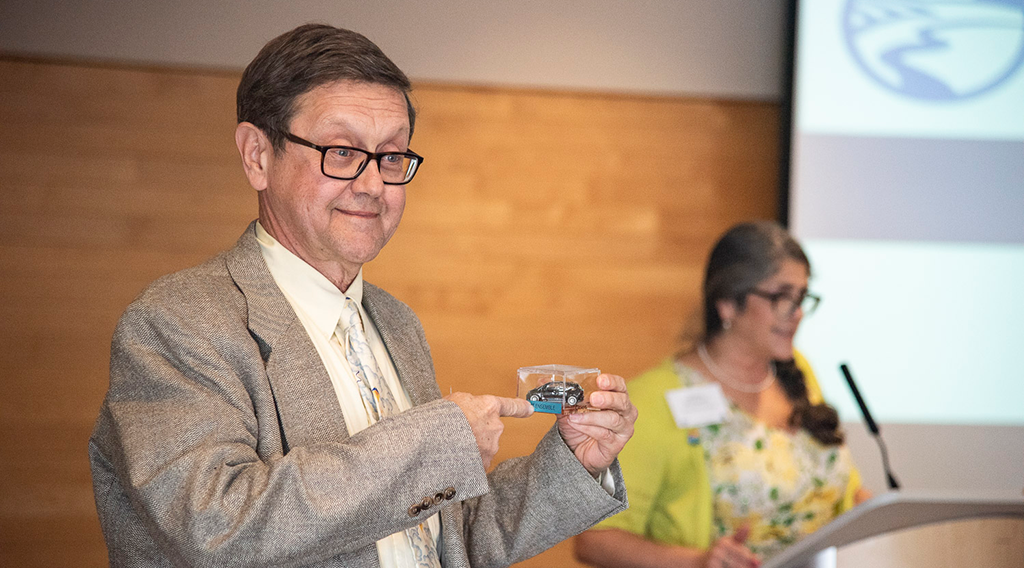Cities Charging Ahead! That’s a Wrap, Now What?
September 10, 2019 | Diana McKeown | Education

During 2018-19, 28 Minnesota cities worked together in regional cohorts through the Cities Charging Ahead! (CCA) project to learn and act together to become “electric vehicle (EV) ready communities.” These cities increased their knowledge significantly and made strides toward their goals to foster EV adoption in their communities. CCA, which was led by the Great Plains Institute and Clean Energy Resource Teams, officially wrapped up in June but the cities have expressed an interest in continuing to meet periodically in their regional cohorts. To build on this interest and the knowledge gained through CCA, we’ve developed resources that are now available for other cities to learn from.
Accomplishments by the numbers
At the beginning of CCA, the cities each chose one or more EV related best practices from the GreenStep Cities program to focus on during the project. Many cities chose best practices related to three categories: fleets, charging stations, and guiding private development. By the end of CCA, the cities completed 51 best practices, including one city that completed seven!
Here are some highlights through June 2019:
- Ten cities participated in fleet analyses to determine opportunities for and replacing vehicles with EVs.
- Twelve cities purchased, leased, or plan to purchase a total of 21 EVs!
- Eleven cities installed or plan to install a total of 27 charging stations.
- Thirteen cities either accomplished or are working toward implementing guidance on EV-ready development in the private sector.
More detail on accomplishments can be found at driveelectricmn.org/cities-charging-ahead.
EV-olution
One of the highlights of the CCA project was the EV-olution event held in March, which brought all the regional cohorts together in one room along with stakeholders including state agency staff, electric utilities, county staff, and other interested parties. The cities shared the progress they were making on advancing EV readiness in their cities during panel presentations. We also recognized several cities for their progress and achievements. You can read more about the event and see the presentations, including the keynote speaker Michael Salisbury, transportation energy lead at the City and County of Denver.
What’s next?
Tools and resources
To continue the momentum and share resources from CCA, we’ve launched a new menu item on the Drive Electric MN website called “communities” with three sub-pages: Becoming EV Ready, Cities Charging Ahead!, and EV Charging Guidance.
- Becoming EV Ready. Cities have tremendous influence over how and where infrastructure is built and serve as a critical and necessary partner in the transportation electrification market transformation effort. This page discusses the five principles of what constitutes an EV ready city and provides resources to get you started.
- Cities Charging Ahead! This page presents accomplishments from the cohort and provides a slew of resources designed to help local governments educate community members about electric vehicles.
- EV Charging Guidance. This page is designed to provide guidance to communities on the type of charging station to install, where to install it, and considerations before installation.
We hope these pages will help hundreds of cities, counties, and others learn the facts about EVs and provide the steps and tools to get started on their own EV journey.
Several resources are accessible from the CCA sub-page including case studies and webinar recordings. At the bottom of the CCA sub-page, communities can gain access to another resource page broken into categories: Educate your Community, Engage your Audience, Promotional Tools, and Take Action. These resources include items like a customizable slide deck with over 100 slides full of EV information to educate a variety of audiences, messaging handouts that dispel common EV myths and perceived barriers, a social media guide, content for local government websites, access to stock photos, and more. We’ll share information about these resources at several upcoming speaking engagements and other outreach efforts.
Continued work with cities
The Great Plains Institute and CERTs staff are just starting to work with a group of cities interested in pairing EV charging stations with solar.
We are also planning to work with a small group of municipal utilities in Minnesota to explore a similar effort to CCA. We will assist them in surveying and educating members, understanding the resources available, and building a set of tools/programming specifically for municipal utilities.
Acknowledgments
The Great Plains Institute and CERTs, which co-led CCA, want to extend a special thank you to our partners and funders: Xcel Energy, Carolyn Foundation, Energy Foundation, Minnesota Departments of Commerce and Administration, the Minnesota Pollution Control Agency, and event sponsors for EV-olution. We couldn’t have accomplished all that we did without their support.
A HUGE thank you to all the city participants that spent countless hours traveling to and from meetings, participating fully in the meetings, attending webinars, and providing valuable information via interviews and surveys. This project’s success is because of all those amazing, passionate people. It was truly a joy and honor to work with them over the past 18 months.
Metro Cohort:
Bloomington, Burnsville, Coon Rapids, Eagan, Edina, Elk River, Falcon Heights, Fridley, Hastings, Inver Grove Heights, Maplewood, Marine on St. Croix, Richfield, St. Louis Park, White Bear Lake, Woodbury
South East Cohort:
Rochester, Red Wing, Winona, Faribault, Albert Lea
North East Cohort:
Virginia, Duluth, Grand Marais, Fond du Lac Tribe
Greater Minnesota Cohort:
Hackensack, Morris, Warren
To stay connected about EV related news, projects, and resources, sign up for the Drive Electric Minnesota newsletter here.
About Cities Charging Ahead!
Led by the Great Plains Institute (GPI) and Clean Energy Resource Teams (CERTs), Cities Charging Ahead! (CCA) was a peer cohort of 28 cities across MN exploring what it means to be “electric-vehicle ready” through individual and collective action on fleets, charging infrastructure, and private development guidance.
